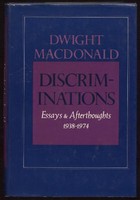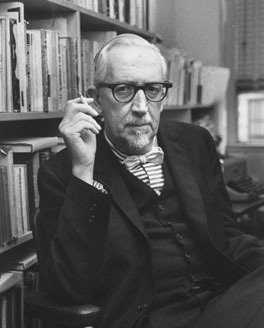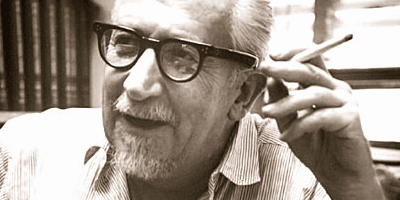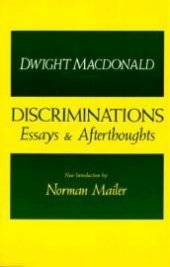From the Village Voice (October 10, 1974). — J.R.
Discriminations
A book by Dwight Macdonald
Grossman, $10
by Jonathan Rosenbaum
Dwight Macdonald’s latest collection of articles is a sequel of sorts to his Politics Past — political-cultural and incidental literary criticism that composes a loose chronicle of the times, taking in a span of nearly five decades.
I blush a little to admit it today, but Dwight Macdonald was the first film critic I ever took seriously. He liked Citizen Kane, Breathless and Shadows and so did I, but I think the clincher was his prose — a rare kind of magazine writing, bursting with energy, that danced or sang or clowned regardless of what it was saying, with a fine ear for polemics and invective. This latter talent has gradually become known as his specialty. More humanistic and less of a school marm than John Simon and a lot more folksy and homespun than Gore Vidal, he shares with them the status of Master of the Chopping Block. (For the best whacks, see my favorite Macdonald collection, Against the American Grain [much of it recently reprinted, in 2011, as Masscult and Midcult: Essays Against the American Grain].)
But he usually takes on a different coloration in his political writing, where his loves and hatreds become more personal and complex — more mutable and prone to reversals or other kinds of second thoughts. They become part of a living tissue rather than a fixed grid to lay over works and cultural phenomena, and they exhibit more of the writer — for better and for worse — because they engage a lot more than just his wit or his aesthetics.
When Macdonald takes on Norman Cousins, Tom Wolfe, and Marshall McLuhan in the present book, the results are pale reflections of his best diatribes: One mainly feels that he’s going through familiar motions. But he confronts the Constitution, the Warren Report, and the Columbia Student Strike here with a lot more than tweezers. One senses something much closer to a whole man responding, and not merely a set of programmed cultural stances. (As Harold Rosenberg pointed out years ago, “Macdonald’s taste for kitsch is largely negative, but it is genuine…”)
Discriminations is an embarrassing and honest and valuable book because it revels so openly in its own contradictions and vacillations. Chart the political changes of Macdonald over the 45 years traversed in this book — all the way from skeptical Trotskyite to skeptical anti-Communist, with plenty of side-trips in between — and you wind up with a series of zigzags, and even a few wiggles. Read the many footnotes and afterwords appended to the articles, and you frequently get explicit auto-critiques. (“In general the above wasn’t one of my higher prophetic flights.”)
The book is reliable in another way, too. I find the most trustworthy critics are those who are aware of and candid about their own areas of ignorance. Macdonald’s one of the few critics around who can cheerfully acknowledge both his vanity and his ignorance on a given topic and then use both points in his favor, as badges of authenticity.
This disarming tactic prevents any of his political writing from becoming simply doctrinal. It works less well in Dwight Macdonald on Movies, where he seems relatively unaware of the contradictions involved. On the first page he’s assuring us that “I know something about cinema after forty years [of writing about it],” but 20 pages later he’s parenthetically noting in all innocence that it’s taken him “forty years to realize” that “lap-dissolve” doesn’t mean holding a camera in one’s lap. All proportions guarded — to appropriate a favorite Macdonald phrase — that’s a bit like saying you know something about literature after 40 years, only you just learned that a semi-colon is something other than half a section of the large intestine.
I trust Macdonald a lot more when he’s writing about politics, because there even his eclecticism is always in flux. And better informed — at least he appears to read the Times every day. Of course there are many constants in his prose as well: A penchant for quoting from De Tocqueville, Dostoevsky, Lewis Carroll, and, particularly, himself, with some of the same aphorisms and anecdotes reappearing to serve duty on very different occasions. Yet whenever he sets out to tackle a new subject — whether it’s poverty in America or Egyptian tourist attractions — he brings to it the sustained energies of an ambitious amateur sleuth, full of curiosity and initiative.
Despite his heavy credentials as a New York Intellectual, and his long record of Inner Circle squabbles (to which Discriminations devotes more than enough space), he is nonetheless a lone dog in the twists and turns of his arguments. One can agree or disagree with each of his proposed amendments to the Constitution — a wonderful piece that leads off the collection — but seldom simply. One can enjoy and agree with much of the anti-American invective and Anglophilia of “America! America!” and still find the overall viewpoint very American indeed. Or one can question his overall trust in Earl Warren’s report on the Kennedy assassination, yet recognize that Macdonald eloquently anticipates and speaks to those reservations.
Best of all, nothing seems to faze him. He keeps right on fighting the good fight, basking in the brightness of his personality. And he loves to talk about himself. I haven’t read any of his stuff for Fortune (1929-1936), but his style seems to maintain the same consistent high level from 1938 to today, powered by much the same amiable, contagious self-ingratiation.




